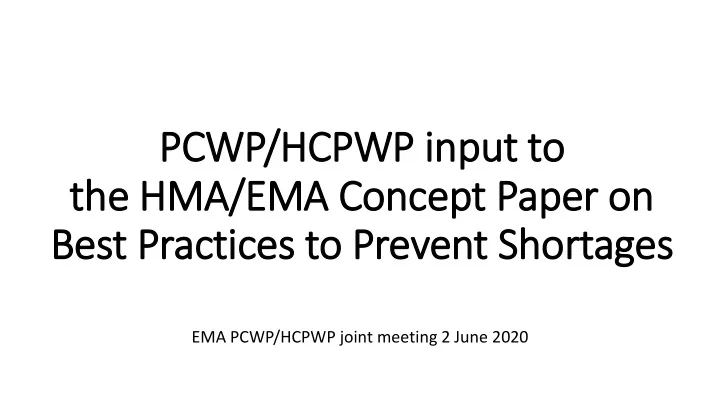

PCW CWP/HCPWP i input t t to o the HMA/EMA Con Conce cept P Pap aper on r on Be Best P t Pract ctices s to o Prevent Sh t Short ortages EMA PCWP/HCPWP joint meeting 2 June 2020
Methodology ( (1/3) • 4 co-rapporteurs from PCWP/HCPWP • Francois Houyez (EURORDIS), Charlotte Roffiaen (EPHA), Jan De Belie (PGEU) and Christiaan Keijzer (CPME) • Input on existing practices and policy recommendations provided by 12 members of the WPs between 20 March and 17 April 2020
Methodology ( (2/3) • Collected input divided into two separate tables and subsequently into three different sheets based on a type of proposed action
Methodology ( (3/3) • Existing practices and policy recommendations analysed according to the following categories :
Existing Pract actice ces (1/ 1/2) • 25 examples addressing prevention, detection, communication, reporting, prescribing, pricing and awareness raising… • Examples: • COVID-19: hospital preparations of some products in risk of short supply due to increasing demand in clinical trials for COVID-19 and off-label use • 2008: mexiletine MAH announcement of withdrawal for commercial reasons. Patient group requests hospital pharmacies to continue manufacturing (2010) and co-funds a phase III clinical trial to extend the authorisation to non- dystrophic myotonia • Complaint to antitrust authorities about the shortage of three cancer drugs due to their price increase (abuse of dominant position)
Existing Pract actice ces (2/ 2/2) • Examples: • Early, automatic reporting and real-time measurement of shortages by healthcare professionals • Creation of „ medicine shortages coordination groups ” that can e.g. locate and acquire raw material that can be used to produce drugs for which shortages are anticipated (compounding) • Essential medicines: Creation of a national registry for immunoglobulins uses, for which there are no alternatives and of an alliance of patient organisations advocating for good prescription practices / calculation of dose needed
Policy recomme mmendations • 17 measures related to reporting mechanism, current legislative framework, contingency plans and procurement practices, among others. • Examples: • Development of harmonised national systems for reporting medicine shortages and a user-friendly database accessible by all stakeholders • Enhancement and enforcement of current obligations of pharma companies • Amendment of procurement practices to focus on more criteria than price and allowing more than one winner for tenders of pharmaceutical products • Creation of an EU Joint Action to further support the exchange of best practices among Member States and to help develop common prevention measures.
Nex ext s steps • PCWP/HCPWP will work with TWG2 and TWG3 on the draft concept paper – the WPs’ members are still invited to provide their input to the presented documents • The WPs can contribute to the EU institutions’ ongoing and forthcoming initiatives on medicine shortages • The WPs are revising their 2013 Common Position on Supply Shortages of Medicines • Should the WPs organise a follow-up call or a workshop dedicated to medicine shortages in 2021?
Revision of th the WPs’ 2013 Common Positi tion • The position will include examples of the impact of medicine shortages on patients and healthcare professionals and proposed management measures • Potential areas to cover – for discussion: • Bringing back manufacturing of medicines and APIs to Europe • Stockpiling of (‘essential’) medicines at EU level • Competence shifts at EU level for the prevention and/or management of medicine shortages including an expanded role of the European Medicines Agency • Creation of one or more non-profit European pharmaceutical undertakings for the production of certain medicines of strategic importance • Closer cooperation and 'solidarity' between Member States • Regulatory flexibility to facilitate movement of medicines across borders • ...
Politi tical i initiati tives on shortages a at t EU level • European Parliament’s report on the shortages of medicines - how to address an emerging problem 2020/2071(INI) • European Commission’s study on root causes of medicine shortages • European Commission’s new pharmaceutical strategy • European MedicinesRegulatory Network Strategy to 2025 • COST action CA15105 • The STAMP’s* discussions on shortages *Commission Expert Group on Safe and Timely Access to Medicines for Patients
Thank you for your attention Piotr Kolczyński (CPME) on behalf of PCWP/HCPWP co-rapporteurs
Recommend
More recommend